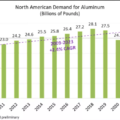European aluminum foil manufacturers see weak demand at the beginning of 2024, according to a statement from ALUFOIL, the association that groups them together.
Figures for aluminum foil deliveries in Europe during the first three months of 2024 indicate that weak demand continues to have a negative impact on volumes. Total shipments reached 217,800 tons, a decrease of 6.2% compared to the same period in 2023, according to figures just released by the European Aluminum Foil Association (EAFA).
European demand fell 3% in the first period of 2024, while exports plummeted 26.6%, continuing the difficult market conditions abroad seen throughout 2023, where sales fell 22% year-on-year.
Although general inflation is now under control, still high interest rates and the continued effect of higher consumer prices have led to very fragile demand in some sectors where aluminum foil is used. In addition, supply chain problems, particularly for raw materials, have led to a slowdown in deliveries to traditional markets such as construction and automotive.
Thinner grades, used mainly for flexible packaging and household foils, generally considered to be a more resilient sector, saw a 7.7% decline in sales compared to the first quarter of 2023. Within Europe, the decline was 4.1% and foreign markets saw a drop in demand of more than 30%.
Deliveries of thicker gauges, used for semi-rigid containers, technical or other applications, fell by 3.6% in the three months to the end of March. While domestic deliveries were slightly lower, at 1%, exports fell by just over 20%. However, it should be remembered that this product category represents a smaller volume of total production, so its impact on overall production figures is minor.
One bright spot is that volumes in the first quarter of 2024 were more than 10% higher than the last quarter of 2023, which saw deliveries well below 200,000 tons. This at least reflects some improvement in demand, even if the figures compared to the same period last year were down somewhat.
Guido Aufdemkamp, CEO of EAFA says, “The current geopolitical situation continues to have a negative impact on all markets, although there are some signs that depressed market conditions are bottoming out.”













